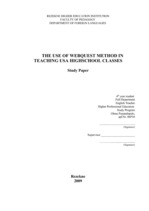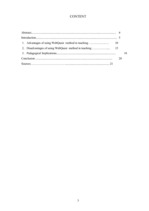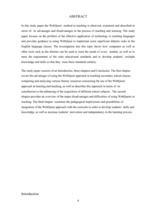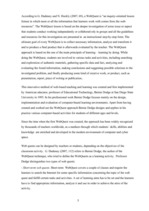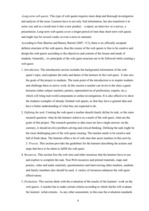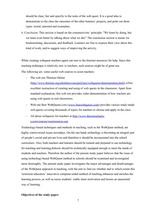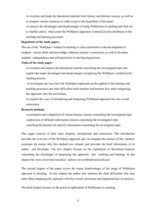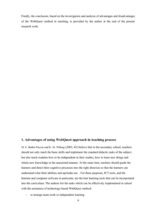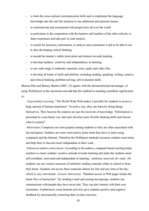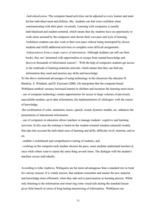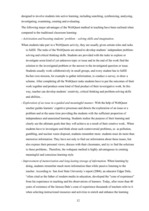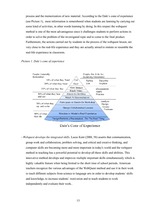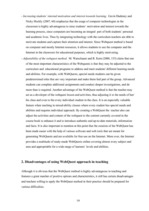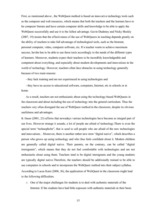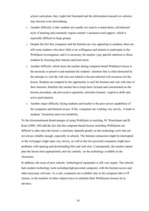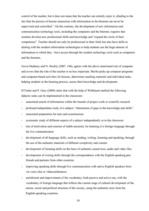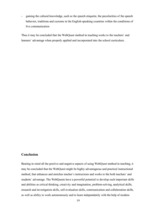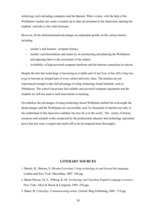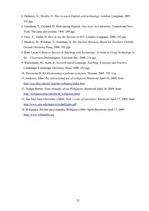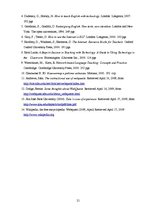-
The use of Webquest Method in Teaching USA Highschool Classes
| Nr. | Chapter | Page. |
| Abstract | 4 | |
| Introduction | 5 | |
| 1. | Advantages of using WebQuest method in teaching | 10 |
| 2. | Disadvantages of using WebQuest method in teaching | 15 |
| 3. | Pedagogical Implications | 18 |
| Conclusion | 20 | |
| Sources | 21 |
Introduction
According to G. Dudeney and N. Hockly (2007, 69), a WebQuest is “an inquiry-oriented lesson format in which most or all the information that learners work with comes from the web-resources”. The WebQuest lesson is based on the deeper investigation of some issue or aspect that students conduct working independently or collaboratively in groups and all the guidelines and resources for this investigation are presented in an instructional step-by-step form. The ultimate goal of every WebQuest is to collect necessary information, analyze and transform it and to produce a final product that is afterwards evaluated by the teacher. The WebQuest approach is based on the one of the main principals of learning – learning by doing. While doing the WebQuest, students are involved in various tasks and activities, including searching and exploration of authentic materials, gathering specific data and fact, analyzing and evaluating the found information, making conclusions and suggesting possible solutions to the investigated problem, and finally producing some kind of creative work, or product, such as presentation, report, piece of writing or publication..
This innovative method of web-based teaching and learning was created and first implemented by American educator, professor of Educational Technology, Bernie Dodge at San Diego State University in 1995. In his professional work Bernie Dodge focuses mainly on the design, implementation and evaluation of computer-based learning environments. Apart from having created and worked out the WebQuest approach Bernie Dodge designs and applies in his practice various computer-based activities for students of different ages and levels.
Since the time when the first WebQuest was created, the approach has been widely recognized by thousands of teachers worldwide, as a medium through which students` skills, abilities and knowledge are enriched and developed in the modern environment of computer and cyber space.
Web quests can be designed by teachers or students, depending on the objectives of the classroom activity. G. Dudeney (2007, 112) refers to Bernie Dodge, the author of the WebQuest technique, who tried to define the WebQuests as a learning activity. Professor Dodge distinguishes two types of web quests:
- Short-term web quests. Short-term WebQuest covers a couple of classes and require the learners to search the Internet for some specific information concerning the topic of the web quest and fulfill certain tasks and activities. A set of learning aims has to be set and the learners have to find appropriate information, analyze it and use in order to achieve the aims of the activity.
…
In this study paper the WebQuest method in teaching is observed, examined and described in terms of its advantages and disadvantages in the process of teaching and learning. The study paper focuses on the problem of the effective application of technology to teaching languages and provides guidance in using WebQuest to implement some significant didactic tasks in the English language classes. The investigation into this topic shows how computers as well as other tools such as the Internet can be used to meet the needs of every student, as well as to meet the requirement of the state educational standards and to develop students’ multiple knowledge and skills so that they meet these standards entirely.

